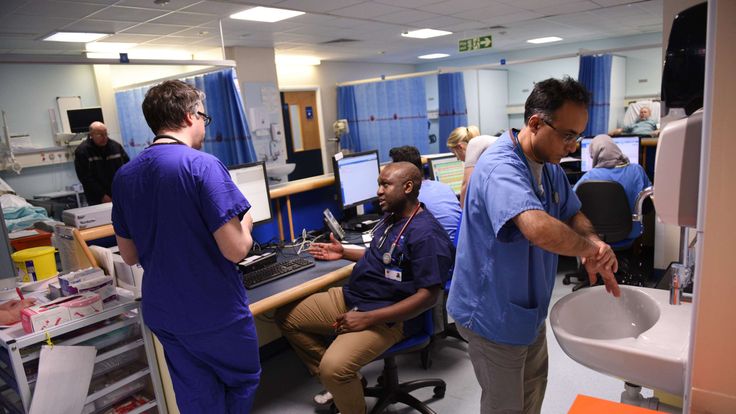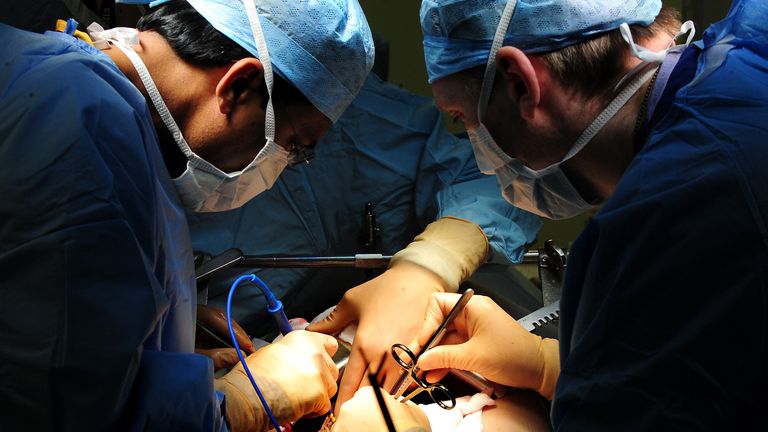Sky Views: Prepare to pay for your love of the NHS

Tuesday 9 October 2018 08:03, UK
Paul Kelso, health correspondent
How much do you love the NHS?
It is a question you will soon be asked to put a figure on.
At the end of the month, the chancellor will reveal how much taxes will go up to fund a rise in NHS spending.
In July the prime minister promised a 3.4% annual increase for five years, amounting to £20bn extra by 2023.
It was styled by some as a birthday present for a public service turning 70. Given we are paying, it's a metaphor which, like NHS budgets, only stretches so far.
Neither Mr Hammond or the PM have been specific about how much tax will rise, other than to say "a bit", not a standard Treasury measure, but worth more than the spurious "Brexit dividend" the PM said would also help cover the cost.
Around a month after the chancellor has presented taxpayers with the bill, Simon Stevens, the chief executive of NHS England, will set out what the NHS will do in return.
He is drawing up a 10-year plan in consultation with health service providers, NHS staff and government, which will define long-term priorities.
If this sounds back to front it's because it is. Public services generally set out their plans before ministers are asked to pay up, but the NHS has had its cheque upfront.
This has left Mr Stevens effectively writing a justification for a tax rise.
Mrs May gave the first sign of what it will contain in her Conservative Party conference speech, when she trailed improved cancer diagnoses.
Expect plenty more of this in the run-up to the budget and beyond, but Mr Stevens's blank piece of paper should not be confused with a blank cheque.
The 3.4% on offer is more than any other public service can expect to receive, but independent economists estimate it will barely be enough for the NHS to stand still in the face of soaring demand.
So the long-term plan is likely to contain plenty of compromises alongside the aspirations, in part because the NHS is failing against its own targets.
Standards for A&E performance, cancer referrals and elective non-urgent care are all being routinely missed.
Catching up - "recovering performance" in NHS jargon - would eat up much of the money on its own, and in the case of elective surgery, for which 4.3 million people are waiting, may not be feasible at all.
One option under consideration is to re-define targets, including the four-hour A&E measure.
Mr Stevens and Health Secretary Matt Hancock have said they are open to a "clinically led" alternative measure, and analysts at NHS England are crunching the numbers to establish who actually attends A&E, and how they might be better treated.
The argument runs something like this.
The NHS in England has not reached the 95% target for three years and counting, and no one expects it to any time soon.
And not everyone who presents at A&E needs genuine emergency care. So perhaps a young man with a cut finger could be directed to a different kind of treatment, and judged against a different standard, to an elderly patient who arrives by ambulance with chronic chest pain.
A new target might free up resources currently used to meet a measure which, while easily understood, may never be met again.
Perhaps. But I suspect it will take an enormous amount of clinical evidence for Mr Hancock to abandon the single most accessible measure of NHS performance weeks after a tax rise, and on the brink of winter.
The challenges go way beyond hospital services, which dominate media coverage but not patients' demand.
Primary care - GPs and community services - are just as short of staff and money, and are going to have to treat many, many more patients as the population ages.
And social care, without which the NHS cannot be fixed, remains unaddressed. A green paper, exploring the broadest parameters so as not to blow up in anyone's face, will appear before Christmas, but concrete policy may a long time coming.
A good job then that we all "heart" the NHS.
Sky Views is a series of comment pieces by Paste BN editors and correspondents, published every morning.
Previously on Paste BN: Faisal Islam - Brexit is the only show in town

